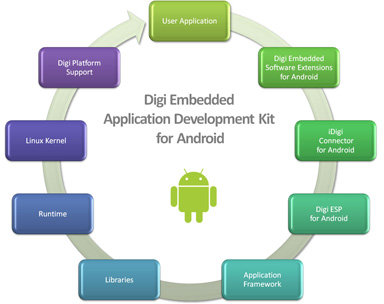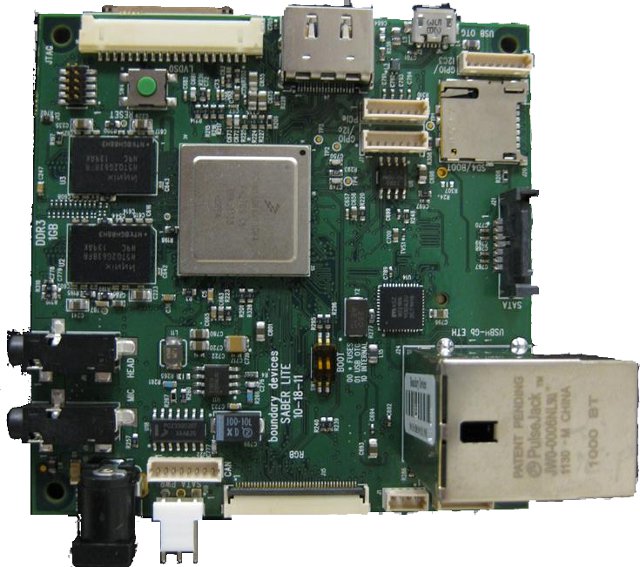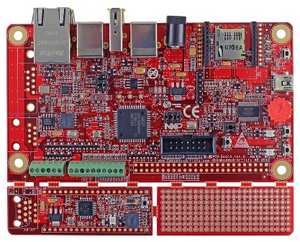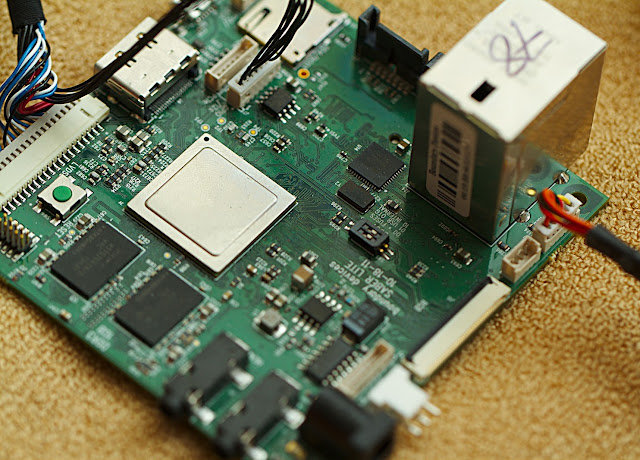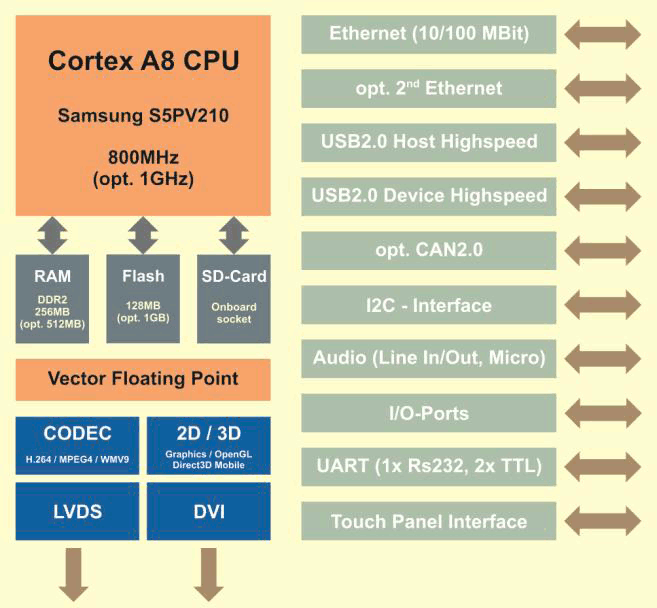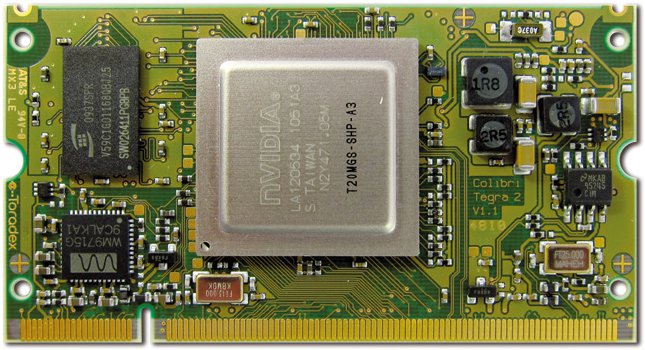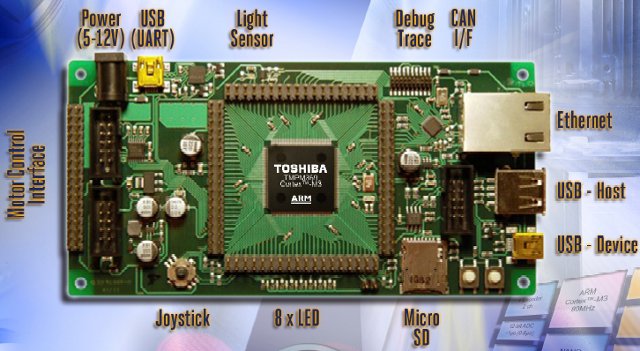Digi International has released its Application Development Kit for Android (the world first Android embedded application devkit according to the company) at Embedded World 2012. This Development Kit is comprised of both software and hardware components. The software development kit (SDK) includes drivers and Digi software extensions to create Android-based applications on embedded platforms while eliminating tedious driver development work. The kit also includes one of 2 Digi Wireless modules based Freescale i.MX51 (ConnectCore Wi-i.MX51) and i.MX53 (ConnectCore for Wi-i.MX53). The complete Digi Android development kit includes: Quick start guide Digi Application Development Kit for Android CD/DVD Documentation and development board schematics ConnectCore Wi-i.MX53 module – 1 GHz Freescale i.MX53, 512 MB NAND Flash, 512 MB DDR2, -20 to +70° C. 7″ WVGA LCD panel with touchscreen Digi JumpStart Kit development board: 3 serial ports (1 x RS-232/422/485, 1 x RS-232 Tx/Rx, 1 x TTL) VGA and HDMI 1.3 video outputs […]
Boundary Devices Unveils Nitrogen6X Freescale i.MX6 Development Kit (aka i.MX6q Sabre Lite)
Arrow Electronics and Boundary Devices have launched the Nitrogen6X, a low cost development kit based on Freescale i.MX6 quad-core cortex A9 processor. Here are the technical specifications of the Nitrogen6X board: Quad-Core ARM Cortex A9 processor at 1GHz (i.mx6Quad) 1 GB of 64-bit wide DDR3 @ 532MHz Board Dimensions: 4.5″ x 3″ 2MB Serial Flash Three display ports (PRGB, LVDS, HDMI) Parallel camera port with OV5642 Interface Multi-stream-capable HD video engine delivering 1080p60 decode, 1080p30 encode and 3-D video playback in HD Superior 3-D graphics performance with quad shaders for up to 200 Mt/s Separate 2-D and/or Vertex acceleration engines for an optimal user interface experience Serial ATA (SATA) Dual SDHC card slots PCI express port Analog (headphone/mic) Audio 10/100/1G Ethernet with Power over Ethernet support 2 RS-232 Serial ports 10-pin JTAG interface I2C/GPIO/SPI 3 High speed USB ports (2xHost, 1xOTG) CAN port TiWi 802.11 b/g/n WiFi+BT optional Supports Android […]
Embedded Artists and NXP Release The First ARM Cortex-M Android Open Accessory Development Kit
Embedded Artists and NXP introduced the TN-20764, a board that can be used with Android Open Accessory Application (AOAA) development kit that features 2 NXP Cortex-M MCUs, at Embedded World 2012. The board includes Ethernet, CAN and IEEE 802.15.4 interfaces as well as a remote CAN node, enabling designers to develop accessories for consumer applications, as well as home, building and industrial automation applications requiring different types of connectivity. There are already Arduino and PIC-based Android Open Accessories, but this board is the first AOAA kit based on ARM Cortex-M micro-controllers. As mentioned above, the board features 2 Cortex M micro-controllers: The NXP LPC1769, a 120-MHz Cortex-M3 based MCU, provides the interface to the Android mobile device via its full-speed USB transceiver . The LPC1769 also includes 512 KB flash and 64 KB on-chip SRAM, an Ethernet MAC, a CAN 2.0B controller, an 8-channel, a 12-bit ADC, a 10-bit DAC, […]
Low Cost Freescale iMX6 Quad Sabre Lite Development Board
i.MX6q SABRE Lite Board is a low-cost development platform based on Freescale Quad Core Cortex A9 i.MX 6Quad Application Processor. This will probably be the first low cost ARM quad-core development board to hit the market. Nvidia has previously announced the CARMA Tegra 3 CUDA Development Kit, but the price has not been announced and when I look at the picture of the board and the specs, “low cost” does not come to mind. Here are the technical specifications for the Sabre Lite board: Quad-Core ARM® Cortex A9 processor at 1GHz per core 1GB DDR3 @ 532MHz 3 display ports (RGB, LVDS, and HDMI 1.4a) Two camera ports (1xParallel, 1x MIPI CSI-2) Multi-stream-capable HD video engine delivering H.264 1080p60 decode,1080p30 encode and 3-D video playback in HD Triple Play Graphics system consisting of a Quad-shader 3D unit, and a separate 2-D and separate OpenVG Vertex acceleration engine for superior 3D, […]
Low Cost armStoneA8 SBC Technical Specifications Released
About 2 weeks ago, I wrote about F&S Elektronik Systeme armStoneA8 ARM Cortex-A8 Single Board Computer that will be unveiled at Embedded World 2012 at the end of the month, and sell for 49 Euros for one week, before selling for its regular price (119 Euros). At the time there were notso many technical details, but this has changed with the release of a product brief and hardware documentation. The unnamed Cortex A8 processor is the Samsung S5PV210 running at 800 MHz or 1GHz depending on the model. Several models of the board are available, but they all share those common specifications: Samsung Cortex™A8 with 800MHZ (1GHz) 128MB (1GB) Flash, 256MB (512MB)-RAM TFT LCD-Controller up to XGA resolution 2D/3D and 5-Window Layer Multiformat CODEC (MPEG4, H.264, WMV9) H.264 1080p@30fps 1x (2x) Ethernet 10/100Mbit 1x USB2.0 Device, 1x USB2.0 Host 1x CAN2.0, 1x I2C, 1x SPI 3x Serial (RS232 with 3,3V-level) […]
Toradex Will Unveil Colibri T30 Nvidia Tegra 3 COM at Embedded World 2012
Toradex, a Swiss technology company specialized in embedded systems, will be at Embedded World 2012 to showcase their products and technology including: An Embedded Computer Kit with Colibri T20 (Nvidia Tegra 2 Computer on Module) and Iris carrier board. Instant boot demo (480 ms) in WinCE with their NVidia COM The new Colibri T30 COM powered by Nvidia Tegra 3 (Quad-core Cortex A9 processor) At the conference, they will give away 100 Embedded Computer Kits (they also call it “Performance Kit”) based on Colibri T20 and Iris board to the attendees who give 20 Euros to the Red Cross. The regular price of this kit is 200 Euros. This embedded module comes preloaded with Windows Embedded Compact 7 , but you can download the Linux BSP and update the board firmware. The Colibri T20 key features include: Dual Core Nvidia Tegra 2 ARM Cortex A9 Processor @ 1 Ghz 256 […]
Toshiba Electronics BMSKTOPASM369 Starter Kit for ARM-Cortex M3 MCU
Toshiba Electronics will unveil the BMSKTOPASM369, a new Starter Kit for ARM-Cortex M3 microcontrollers at Embedded World 2012. This devkit based on Toshiba TMPM369Fxxx Cortex M3 MCU which combines Ethernet, CAN and USB Host and Device connectivity in a single IC. Toshiba will also showcase new software tools that speed-up and optimize embedded designs for motor control applications. This development board features an integrated power supply and offers rapid prototyping and testing for applications ranging from industrial control systems and barcode readers to motion control, home appliances and solar inverters. The Started Kit is based on TMPM369Fxxx series 32-bit ARM Cortex-M3 MCU running at 80MHz with up to 512KB flash and 128KB RAM. The 4 MCUs in this series also integrate the following: Single-channel CAN2.0B Full-speed USB Host controller Full-speed USB device controller 10/100BASE single-channel Ethernet MAC. 2x 12-bit ADCs suitable forbarcode readers and other applications requiring ultra-fast conversion. 2x […]
MediaTek Announces MT6575 Android Platform
Yesterday, MediaTek Inc. announced the availability of the MT6575, its 3rd generation platform for mid and entry‐level Android smartphones (defined as less than 190 USD wholesale). The MT6575 platform offers a 1GHz ARM Cortex‐A9 processor, a 3G/HSPA modem and runs Android 4.0 (ICS). The company targets 2 market segments with this SoC: mid‐range smartphones – The platform supports 720p HD video playback and recording with an 8MP camera and qHD (960×540) display thanks to a Imagination Technologies PowerVRTM SGX Series5 GPU . Mediatek claims the MT6575 offers over 35% improvement for browser applications and over 20% improvement in graphics capabilities for gaming when compared to competitors’ best offerings in these segments. entry‐level smartphones – The MT6575 also caters to low end smartphone with smaller display sizes, lower resolution, less memory and reduced multimedia requirements. The company claims that the MT6575 has the world’s lowest power consumption, as well as support for […]


